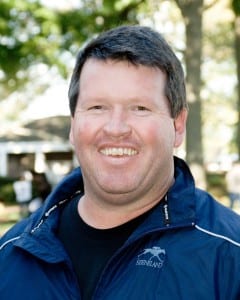In the first of two parts, Doug McCoy examines Delaware’s challenges implementing the national uniform medication program.
by Doug McCoy
Partnerships between race tracks and horsemen are a lot like marriages. There’s a delicate balance between harmony and instability, and a lot of work is involved from both parties to make the unions work. And just like a marriage, third parties often bring problems into the picture that threaten to disturb that delicate balance.
The Delaware Thoroughbred Horsemen’s Association (DTHA) and Delaware Park have been working to improve their marriage in recent years. But new issues with the state’s drug-testing lab have put something of a hurdle in the relationship, with Delaware horsemen growing increasingly frustrated.
One issue is the length of time the laboratory — LGC Sports Science — takes to test the samples provided them.
According to trainer Michael Gorham, president of the DTHA, as of July 14 there were 27 cases where purse money was being held up pending final test results, some dating back as far as May 26, or more than seven weeks.
This delay in releasing purse earnings has a number of stables scrambling to handle their financial obligations while their money sits in the horseman’s bookkeeper’s office.
“We’ve been talking with Delaware Park management about this issue and hopefully there will be some changes soon,” Gorham said. “To ask someone to do without funds they have coming for more than two months is unacceptable.”
John Mooney, director of racing at Delaware Park, agreed with Gorham that the turnaround time was excessive and said he was hopeful something could be worked out between the two parties that would allow purses to be released in a timely fashion.
“Our attorneys are working with those from the DTHA on a solution to this problem,” Mooney said, “We know how important purse money is to owners and horsemen and realize they need those funds to keep their stables operating.”
When the Delaware Thoroughbred Racing Commission agreed that the state would adopt the uniform medication policies promoted by the Association of Racing Commissioners International and the Racing Medication and Testing Consortium, it had to choose a testing lab that was accredited by the RCI. The Commission chose LGC Sports Science, an international testing company whose website states it has been testing “animal sports” for more than 50 years.
After a horse runs, urine and blood samples are collected from the winner of each race as well as other random runners at the test barn; those samples are sent to the testing lab.
While the lab analyzes the samples, any purse money earned by the horse is frozen and, thus, not available to the owner or trainer. Typically, that process takes from three to 10 days in most jurisdictions. Sources said that, in past years purses at Delaware Park would typically be available from a week to 10 days after a horse ran, sometimes several days more if there was a “cloudy” test (a test where there are some indications of a foreign substance but there isn’t enough of a presence of a specific substance or drug to constitute a sample to test “positive.”)
Dr. Richard Sams of LGC said that he could not comment about the turnaround time problem because of an agreement with the Delaware Racing Commission.
The accredited labs typically offer more modern, sensitive equipment able to pick up minute overages in the tested samples. While the horsemen agree that better testing is good for the game — and no one wants to award purse money to those using illegal substances — they contend that a two-month delay on a cloudy test is causing real hardship to honest barns.
“We understand that if it is proven a horse was given an illegal substance then certainly the connections of that horse are not entitled to any purse money, and they are subject to fines and/or suspension for those infractions,” said Gorham. “But these frozen purses are for tests that are inconclusive and need additional testing. There needs to be a better way of handling situations like this.”
Mooney agrees and says that Delaware Park wants to work with the horsemen. But the ultimate solution, he says, is out of his hands.
“Since the laboratory was retained by the Delaware Racing Commission, they are the ones who must work with them to resolve this,” Mooney pointed out. “But in the interim we need to help the horsemen have their money available in a reasonable amount of time.”
Notes from the First State
The Delaware Thoroughbred Horsemen’s Assocation (DTHA) and Delaware Park recently announced finalization of a working agreement between the two parties that runs through the 2015 season. Some of the major factors: Delaware Park’s commitment to race 81 days again next season as well as agreeing to continue to leave the backstretch and race track open for training 10 months a year, closing January and February.
“We (DTHA) gave up a little bit in purse money but we did so to get stability on a near year-round basis for our members,” said Gorham. “It’s difficult to run a stable not knowing whether the backstretch and track will be open or how many days the track is going to run the following year. With this agreement our members can make housing plans, arrange for stabling during the down time and make sure their people are taken care of. It also allows them to plan for down time for the horses.”










This was the lab that whimpered on the paulick report that it didn’t get the MD contract. The previous lab was the one that picked up the coramine positives at Delaware and Charletown. Guess the DRC made the wrong choice.
Man, for a pony, you sure do have sources.
iPads make web surfing much easier on equids
Thanks for the article. It is quite interesting and thought provoking. What are we supposed to think when one of the accredited labs is seemingly having difficulty in determining what constitutes a positive ? I have serious doubts that uniform drug testing is actually uniform. It appears that there are differing capabilities among the accredited labs. One thing is for certain, the more I think I know about racing medications, the more I realize how little I know. Maybe the USADA is really the only way to go if we are going to have a truly uniform drug policy.
Given the number of State Crime Labs that have been compromised including Delaware’s; Given the number of incriminating Lab results that are lost or destroyed by Hospitals involving Mal-Practice suits;Given the number of hard drive failures in the IRS; do you really believe that drug testing in Horse Racing or for that matter, Professional Sports is Clean?